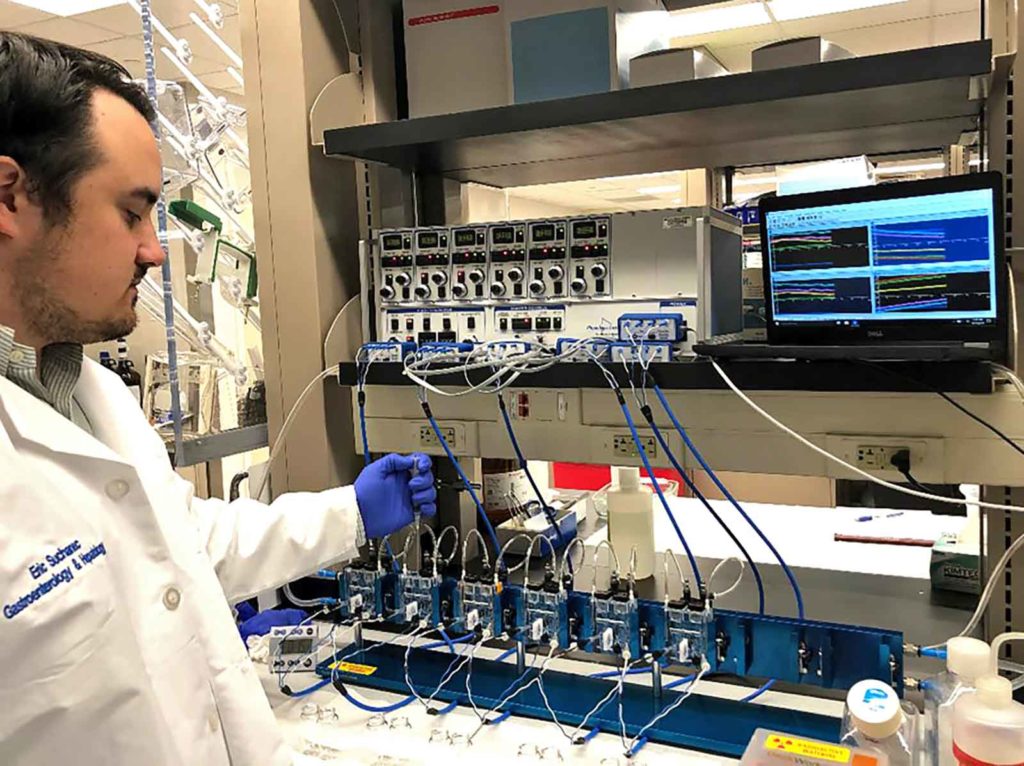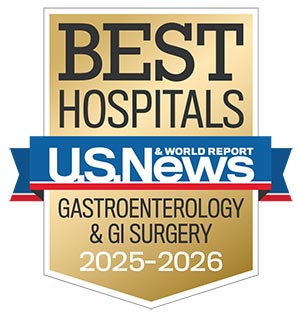New Faculty Boosts Basic and Translational Research as Gut Health Research Ramps Up at Penn State College of Medicine and Worldwide
The gastrointestinal (GI) tract has been a subject of intense research worldwide in recent years, with recognition of the fact that several systemic diseases and conditions—from obesity and diabetes to rheumatoid arthritis—may have origins in or be influenced by the gut.1 Also, several inflammatory bowel diseases are still difficult to treat, and knowledge about their pathogenesis is limited. Penn State Health is now at the forefront of research to increase the body of knowledge about GI health and conditions, to ultimately improve treatment and prevention of GI-related health problems.
Last year, several new faculty joined Penn State Health Milton S. Hershey Medical Center’s Division of Gastroenterology and Hepatology. These investigators focus on numerous areas in GI research, including leaky gut, inflammatory bowel disease, gut-liver axis and gut immunology.
“I think we’re all proud to join Penn State College of Medicine’s renowned faculty, and we’re excited about the research opportunities and the chance to collaborate with other investigators here,” said Prashant Nighot, associate professor in the GI Division.
Dr. Thomas Ma: Cytokines, Probiotics and the Gut Barrier
Penn State’s new chair of the Department of Medicine, Dr. Thomas Ma is well-established as an international leader in research on cytokines and the gut barrier, with two decades of research funded by the National Institutes of Health (NIH). His work defined the role of tight junctions in the intestinal barrier in intestinal homeostasis.2 He is now pioneering research on the use of probiotics, or beneficial bacteria, to tighten the defective intestinal barrier in inflammatory bowel disease (IBD) patients. Probiotics are considered safe and have a positive influence on gastrointestinal function. Thus, employing probiotic bacteria to help treat intestinal disorders could present a win-win situation, with no downside.
Ma is also actively investigating the role of leaky gut in alcoholic hepatitis and the possibility that alcoholic liver disease may be treated with probiotic bacteria that can tighten the intestinal junction barrier.
Prashant Nighot: Autophagy in Intestinal Mucosal Homeostasis
Prashant Nighot, MVSc, PhD, is investigating the role of autophagy in intestinal mucosal homeostasis in health and disease. Autophagy (self-eating) is a cell survival mechanism that gets rid of unnecessary, misfolded and long-lived proteins and organelles and helps cells survive under stress. Nighot’s pioneering studies have shown that induction of autophagy enhances the intestinal barrier. Currently, in an NIH-funded study, he is investigating the molecular mechanisms of autophagy regulation of the tight junction barrier and how the autophagy mechanism could be harnessed to prevent intestinal inflammation.

Ussing chambers (for measuring epithelial membrane properties) are being used to study intestinal ion transport and permeability in Prashant Nighot’s laboratory.
Iryna Pinchuk: Mesenchyme and Immune Response
Iryna Pinchuk, PhD, associate professor in the GI Division, comes to Penn State from the University of Texas Medical Branch, Galveston, Texas. Her NIH-funded work has established colonic myofibroblasts as an important immunological component in the colonic mucosa. Pinchuk’s studies are focused on how the colonic mesenchyma shapes up the immune responses under mucosal tolerance, different colitis conditions and colonic cancers.
Rana Al-Sadi: MMPs and IBD
The epithelial barrier and structure of intestinal epithelium is disrupted under inflammatory conditions. Matrix metalloproteinases (MMPs) are the enzymes that cleave the extracellular matrix and play an important role in the healing and reorganization of intestinal mucosa during inflammation. Rana Al-Sadi, PhD, assistant professor in the GI Division, is investigating the role of MMPs in IBD. With the Crohn’s & Colitis Foundation’s Career Development Award, Al-Sadi has demonstrated that MMP-9 plays a pathogenic role in IBD by disrupting the intestinal barrier.
Meghali Nighot: Proton Pump Inhibitors and the Intestinal Barrier
Meghali Nighot, MVSc, PhD, assistant professor in the GI Division, is studying the effect of long-term use of proton pump inhibitors on the intestinal barrier. It turns out that, similar to the stomach, the colon has its own acid-producing proton pump. Nighot is exploring the role of the colonic proton pump (H+K+ATPase) in colon homeostasis and disease.

Prashant Nighot, MVSc, PhD
Associate Professor, Department of Medicine, Division of Gastroenterology and Hepatology, and Penn State Cancer Institute
Phone: 717-531-4950
Email: pnighot@pennstatehealth.psu.edu
Fellowship: Department of Clinical Sciences, North Carolina State University
Graduate Research Assistantship: Comparative Biomedical Sciences Program, North Carolina State University
PhD: Comparative Biomedical Sciences, North Carolina State University
Connect with Penn State Health Gastroenterology and Hepatology on Doximity
References:
- Cani PD. Human gut microbiome: Hopes, threats and promises. Gut. 2018;67:1716-1725. Available at https://gut.bmj.com/content/67/9/1716.
- Ma TY, Nighot P, Al-Sadi R. Tight junctions and the intestinal barrier. In: Said HM, ed. Physiology of the Intestinal Tract. 6th ed. Academic Press; 2018:587-639. Available at https://sciencedirect.com/science/article/pii/B9780128099544000256?via%3Dihub

